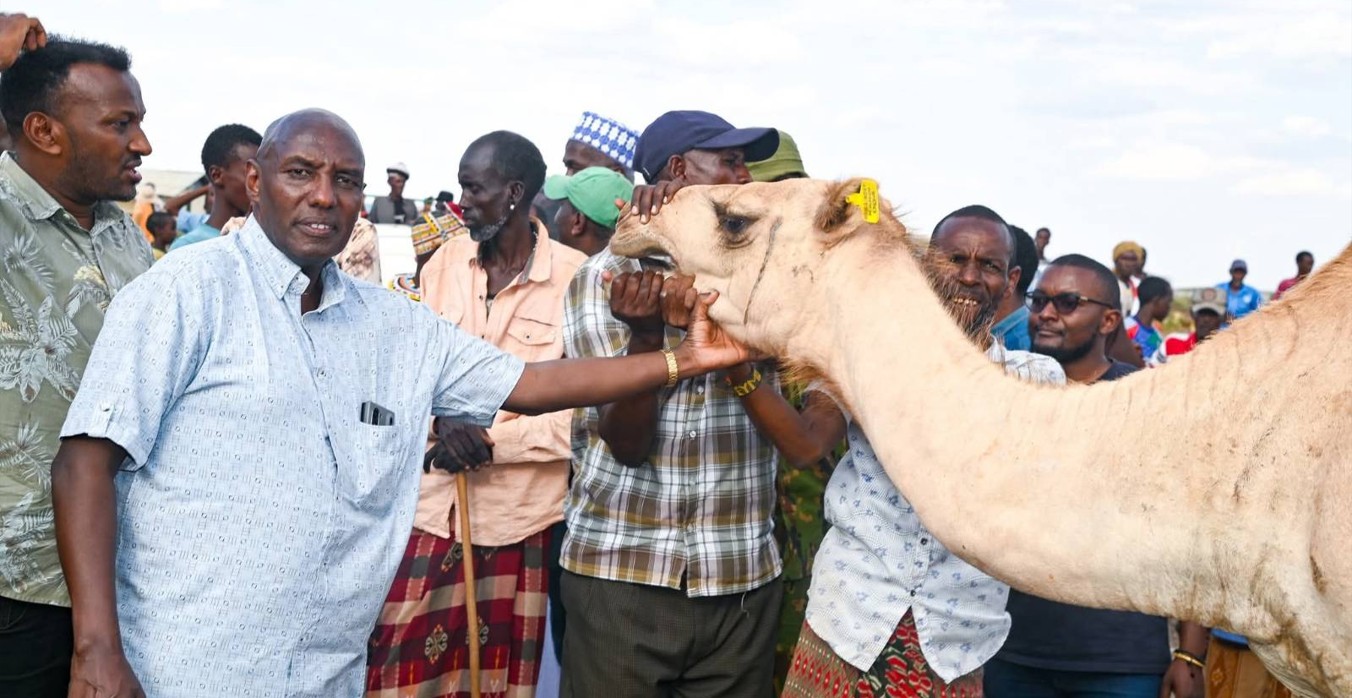Marsabit households get 100 camels in government push to restore livelihoods

The government, through the NDMA and State Department for ASALs, has launched a livestock restocking drive in Marsabit County—distributing 100 camels to drought-hit families in Kargi to help restore livelihoods.
Several households in Kargi, Marsabit County, have received 100 camels from the government under an ongoing livestock restocking programme aimed at supporting pastoral communities affected by recurrent droughts in Kenya’s arid and semi-arid lands (ASALs).
The initiative, implemented by the National Drought Management Authority (NDMA) in partnership with the State Department for the ASALs and Regional Development, targets vulnerable households that lost their livestock to drought. It is designed to help families rebuild their livelihoods and strengthen resilience against future climate shocks.
More To Read
- Kindiki unveils Sh1 billion plan to power 6,100 Marsabit homes
- Garissa County launches digital livestock vaccination drive to boost pastoralist resilience
- Marsabit residents demand reopening of Hillo gold mines amid hunger and job loss
- Judge suspends key Marsabit Assembly committees over alleged illegal formation
- Marsabit launches Desert Stars Hub to drive innovation, climate resilience
- Red Cross launches Sh2.4 billion emergency appeal to combat escalating climate crisis
It follows a similar exercise held in September in Butiye Ward, Moyale Constituency, also in Marsabit County, where another 100 camels were distributed. The two allocations are part of a broader plan to supply 400 animals across four constituencies in the county.
The restocking programme was launched under the directive of President William Ruto to address the economic and social impacts of prolonged droughts on pastoralist communities. By restoring livestock assets, the government hopes to boost food security, raise household incomes, and support long-term recovery in drought-prone areas.
Speaking during the handover event in Kargi, the Principal Secretary for the ASALs and Regional Development, Kello Harsama, said the government remains focused on restoring livelihoods and promoting resilience through community-based recovery efforts.
“In the ASALs, livestock is not only a source of income but a way of life. Through this restocking programme, we are restoring hope, rebuilding livelihoods, and enhancing resilience in line with the government's bottom-up economic transformation agenda (BETA),” said PS Harsama.
Recover from drought
He added that the government intends to ensure no one is left behind in efforts to help communities recover from drought and other climate-related challenges.
“We are committed to ensuring no one is left behind as we work to transform livelihoods in our arid and semi‐arid lands. This is about restoring dignity and resilience, one animal at a time,” he said.
According to the NDMA, the ongoing restocking exercise is part of a wider resilience-building framework that includes several drought recovery interventions, such as rehabilitating water infrastructure, expanding pipelines, developing irrigation systems, strengthening livestock value chains, and improving early warning systems.
The agency noted that these combined measures aim to promote long-term adaptation and reduce vulnerability among ASAL communities.
An NDMA bulletin shows that although many ASAL counties are currently classified under the “Normal” drought phase, the effects of past droughts remain severe. It reports that about two million people in these regions continue to face food insecurity, while more than 850,000 children under five and over 120,000 pregnant and breastfeeding women require urgent nutrition support.
The government has allocated funds for restocking and drought recovery programmes in all 23 ASAL counties as part of its strategy to strengthen rural economies under the Bottom-Up Economic Transformation Agenda (BETA).
In Marsabit County, where livestock keeping is the backbone of the local economy, the distribution of camels in Kargi and Butiye is seen as a vital step toward recovery.
Local leaders and residents say the initiative offers a lifeline to families who lost their herds and are struggling to rebuild.
Joseph Lekuton, the Member of Parliament for Laisamis, welcomed the initiative, describing it as a much-needed intervention that directly benefits those most affected by drought. He called for continued government investment in drought mitigation, sustainable rangeland management, and support for pastoralist economies to ensure lasting stability.
Top Stories Today














































